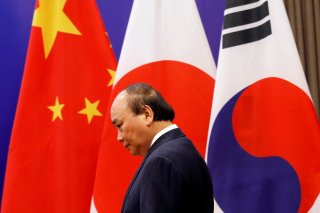Southeast Asian Ruling Parties Pose a Problem for Biden’s Democracy Agenda
Around the world and across recent history, single-party regimes have been both better governed and less likely to stir up international trouble than military regimes or personalist regimes.
Ruling Parties as Geopolitical Partners
This makes Singapore and Vietnam a very different kind of authoritarian regime than the sorts that both the international community and their own populations tend to find most unbearable. Unlike Myanmar, Singapore and Vietnam are not countries where authoritarian rulers lack legitimacy, or are confronted by an organized opposition that enjoys proven electoral superiority. Unlike North Korea, Singapore and Vietnam are authoritarian regimes steadfastly committed to the economic uplift of their citizens. And unlike Russia, Singapore and Vietnam are entirely focused on stabilizing their own systems rather than destabilizing or reshaping the international system. Authoritarian though they may be, regimes in both Singapore and Vietnam are fundamentally legitimate, developmental, and internationally pro-status quo.
This pattern is not unique to Singapore and Vietnam. Around the world and across recent history, single-party regimes have been both better governed and less likely to stir up international trouble than military regimes or personalist regimes. The two points are intimately related. It is precisely because ruling parties provide political stability that authoritarian regimes backed by them feel little need to stir up trouble overseas. Military and personalist regimes generally lack the tools to legitimate themselves through good governance, and must find less palatable alternatives, such as external aggression. Ruling parties have it good at home, and tend to be loath to risk a good thing by mixing it up with overseas powers.
Partnering with ruling parties might seem like a blatant betrayal of the Biden administration’s democratization agenda. But this need not be the case. Asia’s history of democratization is one in which strong ruling parties have gradually liberalized as they saw the risk of democratization to be relatively low. If opening up the political system will neither destabilize the system nor remove the ruling party from power, then democratic reforms become a plausible step forward. This was the main story of democratization in Japan, Taiwan, and South Korea. It could well become the story of democratization in Singapore and Vietnam in the years to come. After all, who could possibly defeat either Singapore’s PAP or Vietnam’s VCP in free and fair elections?
One could even venture to push the argument one step further. If ruling parties that enjoy political stability at home and have enjoyed considerable economic development success not only make workable geopolitical partners, but also make strong candidates for democratization from above, then is it too soon to give up all hope that China might someday become a democratic partner for the United States as well? To be sure, prospects for U.S.-China partnership, Chinese democratization, and a strong alignment of American foreign policy with its democratic ambitions in Southeast Asia are all distant hopes for the time being. But one key lesson of America’s growing engagement with Singapore and Vietnam might be that none of these things has to remain true forever.
Dan Slater is a nonresident fellow at the American Enterprise Institute. He is also the director of the Weiser Center for Emerging Democracies, the Ronald and Eileen Weiser Professor of Emerging Democracies, and a professor in the Department of Political Science at the University of Michigan.
Image: Reuters.

